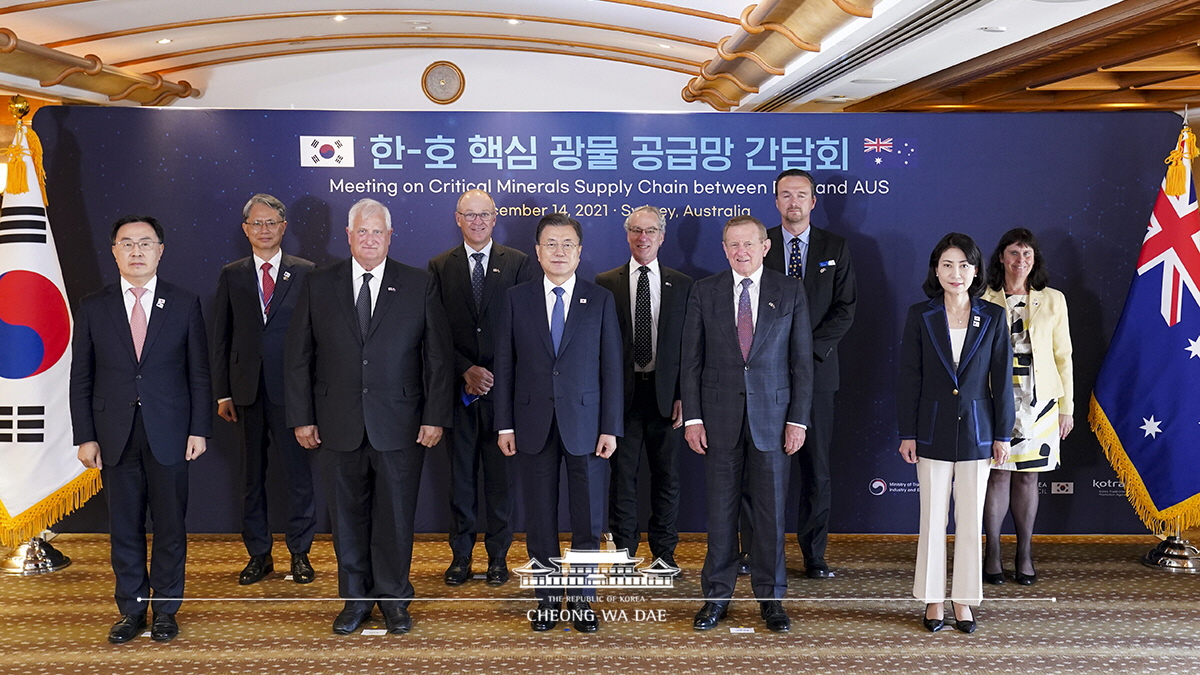이 웹사이트는 제19대 대통령 임기 종료에 따라 대통령기록관이 「대통령기록물 관리에 관한 법률」에 의해 이관받아 서비스하는 대통령기록물입니다. 자료의 열람만 가능하며 수정 · 추가 · 삭제는 불가능합니다.
다만, 「개인정보보호법」에 의하여 개인의 정보를 보호받기 원하시는 분은 관련 내용(요청자, 요청내용, 연락처, 글위치)을 대통령 웹기록물 담당자(044-211-2253)에게 요청해 주시면 신속히 검토하여 조치해 드리겠습니다. 감사합니다.
SPEECHES & REMARKS
BRIEFINGS
Remarks by President Moon Jae-in at Meeting on Critical Minerals Supply Chain between Korea and Australia

I am happy to see everyone. Chairman Simon Crean of the Australia-Korea Business Council and business leaders spearheading Australia’s mineral industry, I am pleased to meet you all.
The most vibrant trade between Australia and Korea is taking place in the mineral industry. Korea is the third largest market for Australia’s mineral exports. Australia supplies nearly half of Korea’s total mineral imports. Our bilateral trade is on the cusp of breaking the US$40 billion mark for the first time in history this year. Minerals account for almost 45 percent of the total amount.
In this meaningful year that marks the 60th anniversary of the establishment of diplomatic relations between our two countries, it is a great pleasure to meet business leaders in the mineral sector who have been playing a pivotal role in bilateral economic cooperation.
As countries around the world have stepped up their efforts for carbon neutrality since the outbreak of COVID-19, demand for new minerals has been exponentially increasing. The International Energy Agency projects that the demand for nickel, cobalt and lithium – essentials for rechargeable batteries – will soar twenty-fold by 2040. Demand for the rare-earth elements indispensable for electric vehicles is forecast to surge seven-fold.
Australia – a resource-rich country with the world’s second largest reserves of nickel, cobalt and lithium and sixth for rare-earth elements – is now emerging as a key player in the global supply chain. For its part, Korea is playing another crucial role based on its competitiveness in rechargeable batteries, electric vehicles and semiconductors.
If our two countries firmly join hands in good faith, we will be able to make significant contributions to hastening global supply chain stability and carbon neutrality. I am confident that our two economies, which are making the fastest recovery among major advanced countries, will also take a more vigorous leap forward.
Businesspeople from both countries are taking the lead in enhancing cooperation. Australian businesses – like Cobalt Blue and QPM – and Korean rechargeable battery companies are building stronger mineral supply chains between our two countries through long-term contracts and equity investments.
The types of cooperation are also diversifying. Australian Strategic Materials is studying the feasibility of jointly developing rare-earth element mines with Korean investors, and it is pushing for the construction of a rare metal smelting plant in Korea. Some companies have started joint R&D with Korean counterparts to reduce carbon emissions in the mineral industry.
Both governments will also actively support the efforts of businesspeople. Following the summit with Prime Minister Morrison yesterday, an MOU for Korea-Australia key mineral supply chain cooperation was signed. We agreed to work together throughout the entire natural resource development cycle, ranging from the exploration, development and production of key minerals to mine disaster management. People-to-people exchanges and technological cooperation will also be strengthened further.
We will share the good ideas presented by business leaders today with the Australian Government and come up with practical and concrete cooperation plans. As our two countries have forged a comprehensive strategic partnership, I hope this supply chain cooperation for key minerals will be the first step for advancing more vigorously into a future of mutually beneficial prosperity.
Thank you.



